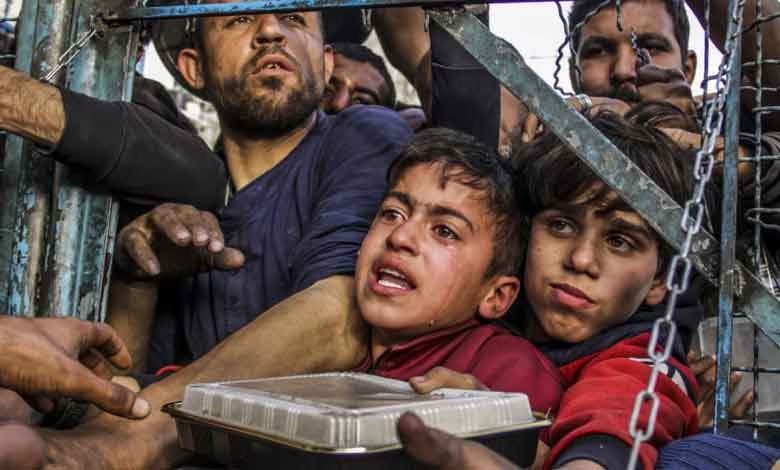
Gaza (Quds News Network)- UNICEF spokesperson James Elder has warned that Palestinian families in Gaza are struggling to secure even a single meal a day for their children amid Israeli blockade, while bombs and missiles enter the besieged territory in far greater quantities than food, describing the humanitarian situation as “bleak, horrific, and hopeless.”
Speaking from Khan Younis in southern Gaza during an official mission, Elder told Anadolu Agency that hopes briefly raised by discussions of a ceasefire have all but vanished.
“There was a momentary uptick in aid and slight improvements in water and food supplies,” he said. “But that optimism has quickly dissolved in the face of a catastrophic blockade on humanitarian relief.”
Families in Gaza, he said, endure relentless nights under airstrikes and spend their days fleeing hunger and explosions. “Every known limit of human endurance has been shattered,” Elder stated. “Mothers go without food for days just to provide a single meal for their children.”
Many families have lived in tents for over six months under continuous tank fire, and are now being forced to relocate yet again. Gaza has faced this devastating reality for more than 600 days, Elder said.
There has been no Eid celebration in Gaza for two years. “Instead of joy, families gather in silence to remember those they’ve lost, surrounded by an overwhelming sense of grief and abandonment,” he added. “There are no homes, no shelters—just loss. People spent their lives building homes and gardens, and now everything has disappeared.”
Estimating the number of children dying from hunger daily or weekly is nearly impossible under such conditions, Elder warned that malnourished children are dying from treatable illnesses.
“Severe malnutrition makes a child 10 times more likely to die from something minor. This is the deadly cycle: hunger, dirty water, and lack of basic healthcare.”
Even accessing hospitals is no longer safe for sick or malnourished children, he said, as the remaining 19 partially functioning hospitals—of which only eight are public—lack essential medical supplies. Gaza previously had 38 hospitals, now reduced to a struggling network that includes nine field hospitals.
Elder estimated that only 10% of the necessary humanitarian aid is reaching Gaza. “More bombs and missiles are entering Gaza than food,” he stressed.
He also expressed concern over the aid distribution system run by the US- and Israel-backed Gaza Humanitarian Foundation (GHF). Describing the system as “militarized” and dangerously limited in scope, Elder said: “Children are being killed simply trying to collect a can of food.”
“This system,” he warned, “is deliberately designed to force people from northern Gaza to the south, and it threatens to dismantle the more effective distribution network we built during the ceasefire, which included 400 humanitarian aid points across the region.”
On March 2, Israel announced the closure of Gaza’s main crossings, cutting off food, medical and humanitarian supplies, worsening a humanitarian crisis for 2.3 million Palestinians, according to reports by human rights organisations who have accused it of using starvation as a weapon of war against Palestinains.
An Integrated Food Security Phase Classification (IPC) report last month warned that almost a quarter of the civilian population would face catastrophic levels of food insecurity (IPC Phase Five) in the coming months.
After more than 80 days of total blockade, starvation, and growing international outrage, limited aid has allegedly been distributed since May 27 by the GHF, a scandal-plagued organization backed by the US and Israel, created to bypass the UN’s established aid delivery infrastructure in the Gaza Strip.
Most humanitarian organisations, including the UN, have distanced themselves from GHF, arguing that the group violates humanitarian principles by restricting aid to south and central Gaza, requiring Palestinians to walk long distances to collect aid, and only providing limited aid, among other critiques.
The UN confirmed that Israel is still blocking food from reaching starving Palestinians with only a few trucks of aid having reached Gaza.
Doctors Without Borders (MSF) warned that “weaponizing aid in this manner may constitute crimes against humanity.”
Subscribe to Our Newsletter
Get the latest CounterCurrents updates delivered straight to your inbox.









































